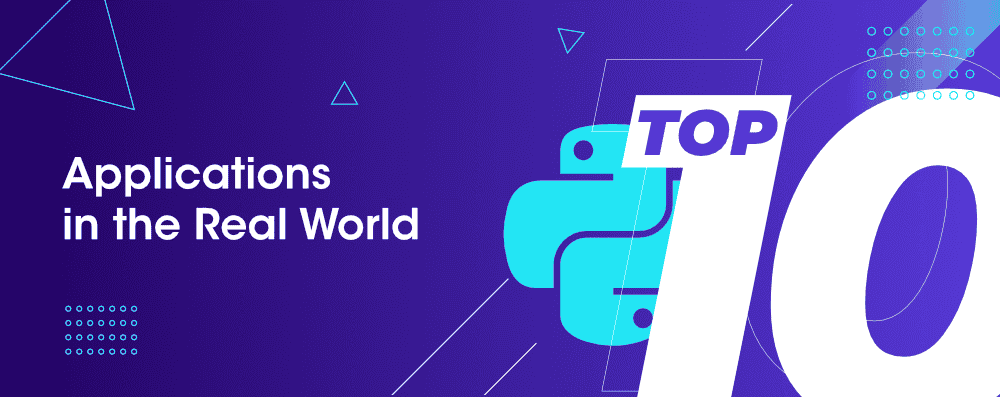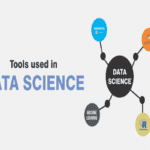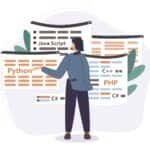Python, a versatile programming language, finds widespread real-world applications across multiple domains. In web development, frameworks like Django and Flask simplify building robust web applications. Python’s data analysis and visualization libraries, such as Pandas and Matplotlib, empower Data Scientists and analysts to derive valuable insights.
It excels in Machine Learning and Artificial Intelligence with libraries like TensorFlow and Scikit-learn. Scientific computing, automation, game development, and IoT projects also benefit from Python’s ease of use. In the cybersecurity realm, it’s used for penetration testing and network security. Python’s natural language processing capabilities further extend its reach, making it an indispensable tool driving innovation across diverse industries.
Importance of Python Programming: Highlighting Real-world Applications of Python

Ref: https://miro.medium.com/v2/resize:fit:1200/0*ItYfFlc7xB9xA_cE.jpg
Python is a widely acclaimed programming language renowned for its simplicity, readability, and versatility. With a clean and elegant syntax, Python has become a favorite among programmers, both novice and experienced.
It boasts a comprehensive standard library, fostering rapid development, and has a thriving community of developers who contribute to its ever-expanding ecosystem. Besides, the real-world applications of Python showcase its growing relevance in the tech domain.
Python’s applicability spans numerous domains, from web development and data analysis to artificial intelligence and automation, making it a powerful and accessible tool for a broad spectrum of applications. All this has contributed to making Python one of the most sought-after programming languages. A Python developer gets ₹5,00000 per year in India.
Key Features of Python
Ease of Learning and Readability
Python’s simple and clean syntax makes it easy for beginners to learn and write code. Its readability, resembling plain English, makes it accessible to developers from various backgrounds.
Versatility
Python is a versatile language that can be used for a wide range of applications, including web development, data analysis, artificial intelligence, scientific computing, automation, and more. Its flexibility allows developers to work on diverse projects.
Large Standard Library
Python comes with an extensive standard library that provides pre-built modules and functions for a wide range of tasks. This library reduces the need to write code from scratch and accelerates development.
Community and Ecosystem
Python has a large and active community of developers, which means there is a wealth of resources, tutorials, and support available. The ecosystem includes numerous third-party libraries and frameworks that extend Python’s capabilities for various domains.
Cross-Platform Compatibility
Python is available on multiple platforms, including Windows, macOS, and Linux. This cross-platform compatibility allows developers to write code that can run on different operating systems with minimal modifications.
Productivity
Python’s concise and expressive nature can lead to increased developer productivity. It often requires fewer lines of code to accomplish tasks compared to other programming languages, resulting in faster development cycles.
Scalability
Python is suitable for both small-scale and large-scale projects. It can be used to build small scripts or complex, enterprise-level applications, making it a reliable choice for businesses of all sizes.
Data Science and Machine Learning
Python is the language of choice for Data Scientists and Machine Learning engineers due to its powerful libraries like NumPy, Pandas, TensorFlow, and PyTorch. It is widely used for data analysis, modeling, and building Machine Learning models.
Web Development
Python offers multiple web frameworks like Django and Flask that simplify web application development. It is widely used for building websites, web applications, and web services.
Automation and Scripting
Python excels in automating repetitive tasks, making it a valuable tool for system administrators, network engineers, and anyone looking to streamline workflows and save time.
Community and Industry Support
Python is backed by organizations like the Python Software Foundation, which helps ensure its stability, security, and long-term support. Many companies and institutions use Python, further solidifying its importance.
Artificial Intelligence and IoT
Python is well-suited for developing AI applications and Internet of Things (IoT) solutions, contributing to the growth of these cutting-edge technologies.
Education
Python is widely used in education for teaching programming and computer science concepts due to its simplicity and readability. Many universities and schools include Python in their curriculum.
Open Source and Free
Python is open-source and free to use, which lowers the barrier to entry for developers and organizations.
Community Values
Python’s community emphasizes readability, maintainability, and collaboration, which fosters a positive and inclusive environment for developers.
The importance of Python programming is evident across various industries, and its relevance continues to grow as it adapts to new technological trends and remains a top choice for both beginners and experienced developers. Its versatility, simplicity, and strong community support make it a valuable language for a wide range of applications and domains.
In this blog, we are going to unfold the features and applications of Python along with the importance of Python programming.
Top 10 Uses of Python in Real-world
Python, often recognized for its simplicity and versatility, has emerged as a powerhouse in the world of programming. Its applicability spans across various domains, and one of its notable strengths is its real-time capabilities. Here are some of the key Python applications in the real world:
1. Real-Time Data Analysis
Python can quickly process, analyze, and provide insights. One of the key applications of Python programming is in making data-driven decisions promptly. Many organizations depend on Python to stay competitive and agile in a fast-paced environment.
2. Web Development
In the realm of web development, Python is a preferred choice for creating real-time web applications. Frameworks like Django and Flask enable developers to build dynamic and interactive websites that respond in real time. These applications are used in e-commerce, social networking, and collaborative tools.
3. Internet of Things (IoT)
One of the key Python language applications is in the Internet of Things (IoT). It is used to program IoT devices, allowing them to collect and transmit data in real-time.
Python’s ease of use and wide range of libraries make it an ideal choice for IoT applications. From smart home devices to industrial sensors, Python is a key player in this field.
4. Finance and Stock Market Analysis
Financial markets are highly dynamic, and timely analysis is critical. Python is widely adopted for real-time financial analysis and stock market predictions.
Its libraries for data analysis, such as Pandas and NumPy, make it an ideal choice for processing real-time market data.
5. Scientific and Research Applications
Python is a favorite among researchers and scientists for real-time simulations and modeling. Whether it’s simulating physical phenomena or conducting data analysis in a laboratory, Python is a reliable tool.
It is also an integral part of scientific computing libraries like SciPy and Matplotlib.
6. Gaming and Graphics
Python’s versatility extends to the gaming and graphics industry. Game developers use Python to create real-time, interactive gaming experiences.
Libraries like Pygame and Panda3D facilitate game development. Python’s ease of learning and rapid prototyping make it a popular choice in this field.
7. Social Media Monitoring
In the age of social media, real-time data is of utmost importance for marketing and reputation management.
Python is used to monitor social media platforms, analyze trends, and engage with users promptly. Sentiment analysis and engagement metrics are often powered by Python scripts.
8. Chatbots and Customer Support
Python is employed in creating real-time chatbots that offer immediate customer support.
These chatbots can answer queries, provide information, and even troubleshoot issues in real time. This enhances customer service and reduces response times.
9. Healthcare and Telemedicine
The healthcare sector benefits from Python’s real-time applications, particularly in telemedicine.
Python is used for remote patient monitoring, enabling healthcare professionals to access real-time data on patients’ vital signs and health metrics. This technology has proven invaluable, especially in recent times.
10. Natural Language Processing (NLP)
Python’s NLTK and spaCy libraries are popular for text analysis, sentiment analysis, and language processing.
Frequently Asked Questions
Are There Any Specific Python Libraries for Real-time Data Analysis?
Yes, libraries like Pandas and NumPy are commonly used for real-time data analysis in Python.
How Can I Get Started With Python for Real-time Applications?
To get started, you can explore online tutorials and documentation related to the specific area of real-time application you’re interested in, whether it’s data analysis, web development, or IoT.
Can Python be used for app development?
Yes, Python is suitable for app development. It can be used for mobile apps (Android and iOS) with frameworks like Kivy, desktop apps with Tkinter or PyQt, and web apps using frameworks like Django and Flask. Python is versatile, making it a viable choice for various types of applications.
What are the Real-time Applications of Python?
Real-time applications of Python with examples include web development, Data Analysis, Machine Learning, IoT, chatbots, gaming, networking, robotics, financial trading, monitoring systems, healthcare, and environmental monitoring. Its simplicity, extensive libraries, and community support make it a popular choice for real-time tasks in diverse domains.
Conclusion
Python’s real-time applications have revolutionized various industries. Its adaptability and efficiency make it a top choice for real-time data analysis, web development, IoT, financial analysis, scientific research, gaming, social media, chatbots, and healthcare. Python continues to evolve, shaping the future of real-time applications across diverse sectors.
If you too are keen to make your career as a Python developer, this is the right time to enroll for the Python programming course by Pickl.AI. As a part of this program, you will learn about Python programming, enhance your skills by working on top Python case studies, and explore in-depth real-time applications of Python.
So, log on to Pickl.AI today and enroll for the best Python for Data Science course.












